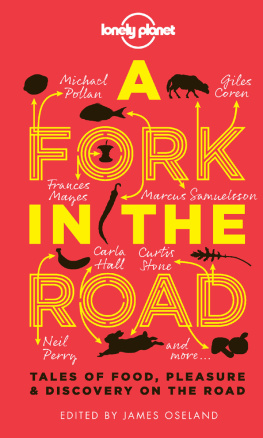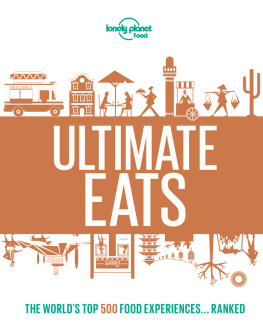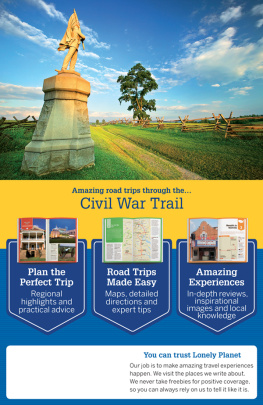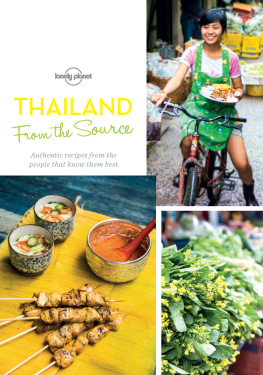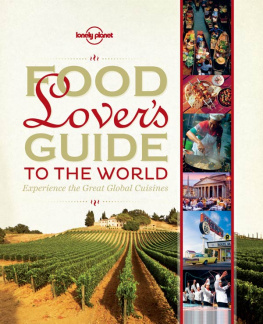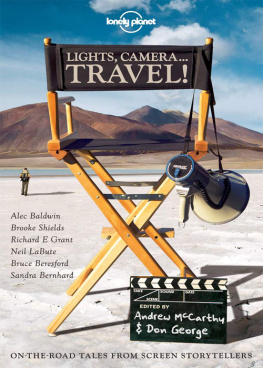A
FORK
IN THE
ROAD


TALES OF FOOD, PLEASURE & DISCOVERY ON THE ROAD
EDITED BY
JAMES OSELAND
LONELY PLANET PUBLICATIONS
Melbourne Oakland London
A FORK IN THE ROAD
Tales of Food, Pleasure & Discovery on the Road
Published by
Lonely Planet Publications
HEAD OFFICE
90 Maribyrnong Street, Footscray, Victoria, 3011, Australia
BRANCHES
150 Linden Street, Oakland CA 94607, USA
201 Wood Ln, London, W12 7TQ, United Kingdom
PUBLISHED OCTOBER 2013
Edited by James Oseland
Cover design by Roberto Devicq
Design and layout by Leon Mackie
1st Editon
eISBN is 9781743601105
Lonely Planet and contributors 2013
LONELY PLANET and the Lonely Planet logo are trademarks of Lonely Planet Publications Pty. Ltd
All rights reserved. No part of this publication may be reproduced, stored in a retrieval system or transmitted in any form by any means, electronic, mechanical, photocopying, recording or otherwise, except brief extracts for the purpose of review, without written permission of the publisher.
JAMES OSELAND
James is the editor-in-chief of Saveur, Americas most critically acclaimed food magazine. Under his editorship, the magazine has won more than 40 awards, including numerous James Beard journalism awards, and three from the American Society of Magazine Editors. His 2006 book, Cradle of Flavor, a memoir with recipes about his time living in Southeast Asia, was named one of the best books of that year by Time Asia, The New York Times, and Good Morning America and won awards from the James Beard Foundation and the International Association of Culinary Professionals. He is also the editor of Saveurs cookbooks, including Saveur: The New Comfort Food and Saveur: The Way We Cook. James is a judge on the cooking competition program Top Chef Masters, and appears as a guest on other international television shows. He is writing Jimmy Neurosis, a memoir of his punk rock youth in the 1970s, for Ecco Press, a HarperCollins imprint. James has lived in India and Indonesia and now resides in New York City with his husband, Daniel.
INTRODUCTION
James Oseland

E very traveler has two or three or even a hundred of them: moments on a journey when you taste something and youre forever changed. It might be a fancy or dazzling dish served by a tuxedoed waiter, or it might simply be an unexpected flavor or unfamiliar ingredient, offered by strangers and encountered by happenstance. At their most intense, these tastes of the new reveal something elemental about the place youre in, and about yourself. These are the kinds of experiences I asked the writers in this book to capture in their stories.
One of my earliest such epiphanies happened when I was twelve. My father took me to a restaurant in Chicago called Jacques, one of the great American temples of French cuisine in the postwar era, a kind of place that doesnt exist much anymore. Though we were only an hour from our suburban home, this elegant redoubt in Chicagos downtown Loop felt like another planet. Dad told me that Jacques was one of the best restaurants in the country. I dont know if that was true, but the duck lorange I had there certainly transformed me. The limpid and tangy sauce, the rich and fatty meat, the mingling of sweet and savory flavorsit was too magnificent for words. My enjoyment of the dish, which Id ordered at Dads suggestion, seemed to draw me closer to this taciturn man whod always been a mystery to me. More than that, it made me feel, for the first time, like an adult. Or at least it gave me a taste of what being grown up might feel like.
Another moment of transformation through food happened seven years later, on my first solo trip abroad, to Southeast Asia. One stormy night, on a visit to Penang, Malaysia, I stumbled upon a night market in the middle of a field on the edge of town. While wandering through the warren of food stalls, in the center of which a Chinese opera troupe was performing, I met an old man who spoke a little English. He took me around to all the vendors, pointing out the foods each of them was selling. I sampled nearly everything, but what I remember more vividly than almost any dish Ive eaten since is the char kuey teow, a Malaysian street-food staple of stir-fried rice noodles. I was blown away by the new flavors: the briny taste of fresh-caught cockles, the bite of Chinese spring onions, the hot, spiky funk of chile sambal, and the deep savor that I later learned can only come from ingredients that have been stir-fried in pork fat over extreme heat. The food was literally life-changing. I felt I suddenly understood this place, and I realized with equal suddenness that I wasnt necessarily the person I thought I was up until that moment. Id discovered another part of me. The depth and brightness of the flavors told of a world that was utterly different from what Id known, and they told me I had a place in it.
Now I seek out that feeling of discovery wherever I happen to be eating. Even the lunch-hour meals I dash out for from my office in Manhattan can transport me, and put me in touch with something fascinating. A sortie to my favorite South Indian vegetarian place on Lexington Avenue or to my favorite Korean lunch counter on 32nd Street loosens the grip of the workday and lets me experience the world again in a purely sensory way. These humble meals tell me that there is always another epiphany around the corner. They remind me of the great, exciting promise of life.
There really is something fabulous and even miraculous about the act of eating. Savoring food is the one thing we do every day that is direct and unmediated. Taste does not lie. Its pure. The impressions it leaves are sharp, invigorating, and emotional. And those impressions can last a lifetime.
Thats what I find so beautiful about the essays in this book. Each of them says something ineffable about how we process and remember tastes and sensations, and about how they alter our view of the world. The stories encompass a vast mosaic of experience, from bitter to sweet to everything in between, and an equally vast range of voices. Some are rough, some are intensely refined. But they all have one thing in common: they chronicle food and eating in a deeply personal way.
Each story will take you on a journey, whether its restaurant critic Gael Greene supping on star fruit in the Peruvian jungle, novelist Francine Prose coaxing a cassoulet from the kitchen of two bickering restaurateurs in rural France, or chef Martin Yan watching his mother at the stove when he was a child in Guangzhou (a wholly transporting experience that didnt involve leaving home). But the essays in this book offer more than armchair travel. They will arouse your appetite for life-changing moments of your own. They will prompt you to seek your own fork in the road.
GILES COREN is the award-winning restaurant critic of The Times of London, to which he also contributes a weekly opinion column. He is editor-at-large of Esquires U.K. edition, is the author of the nonfiction books How to Eat Out, Anger Management for Beginners

